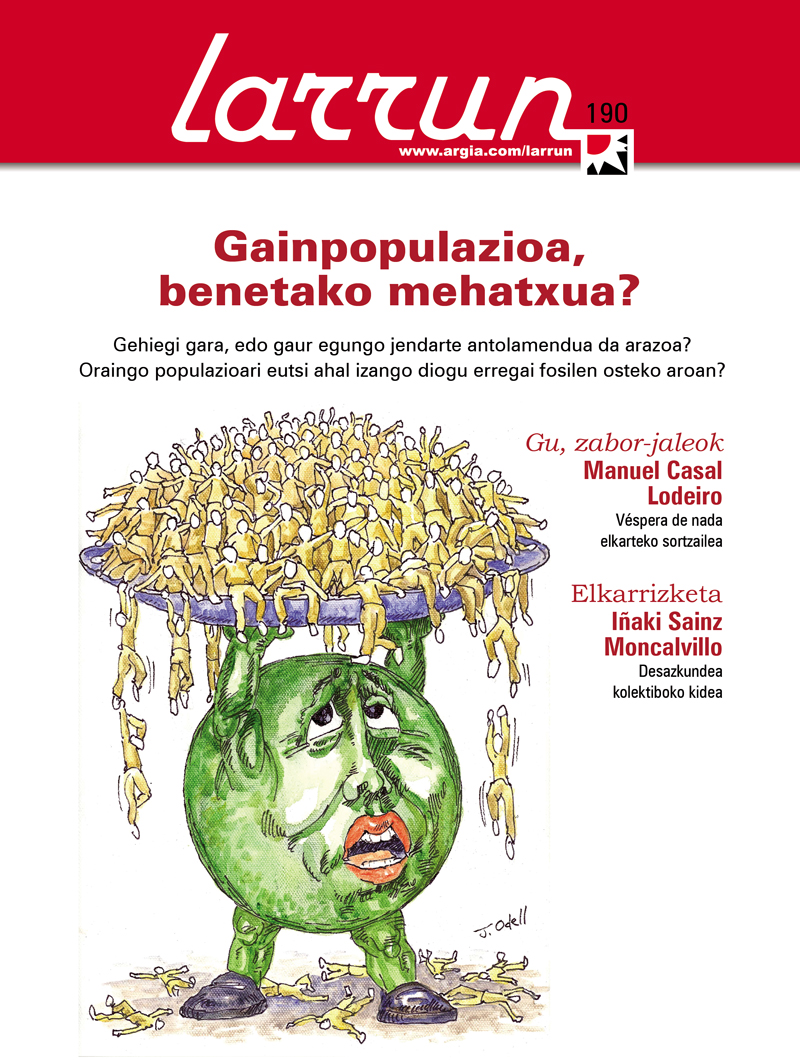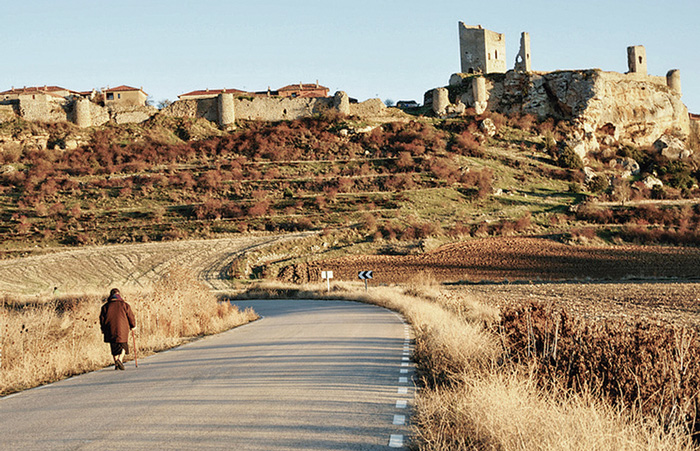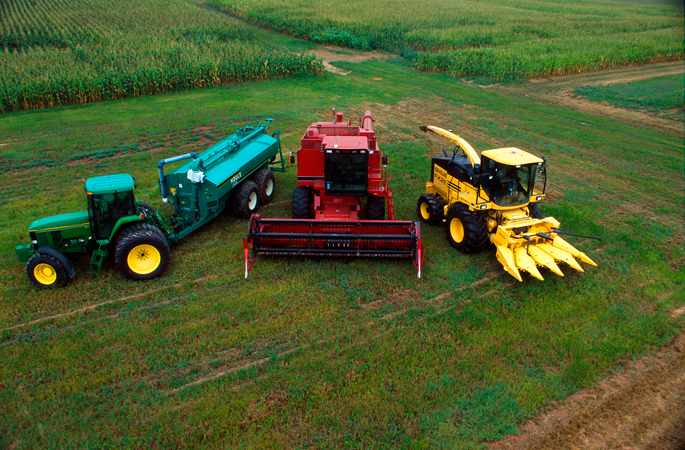“The lack of availability of cheap oil in the future does not have to affect the collapse of civilization”
- Born in Leioa in 1979. He is a telecommunications engineer and his usual work centre is the School of Engineering of the UPV/EHU. Degrowth has been a militant of the group for three years. Sainz does not think that overpopulation is a problem; it is not about how many we are, but how we distribute what we have. He claims that there is a place where we all live with dignity, at least for the time being; that, yes, we should make profound changes in the production and consumption models.

What do you think of the population problem in the Degrowth group?
It is clear that the population cannot constantly grow if there are borders. But there are other social crises, care crises, climate change, biodiversity loss ... We do not believe that the main problem is population, as neomaltusianism says. There are several variables to measure the impact of humanity on the environment, among which is the population, but we must also take into account the consumption of goods – and of what kind – the waste generated… The biocapacity of the planet does have its limits. Each year it can generate a certain amount of resources and absorb a quantity of residuos.Desde 1999 we are consuming more resources than the Earth can regenerate. We live at the expense of future generations.
How does overpopulation affect this situation?
It is wrong to put at the centre of the debate the number of inhabitants, as there is a great difference between the resources and the energies they consume, as well as between the waste they form. It's not the same as a person living in the United States as a person living in Ethiopia, as a rich American than a poor one. Putting the population at the centre of the debate is a simplicity. What we would like is that in the rich global north there is a decline in the use of materials and energy, and an equitable distribution of all these resources, without exceeding the biocapacity of the Earth.
Putting the population at the centre of the debate is a simplicity, you say. So there are those who do. You mentioned neomaltusianism. Some see it as a branch of environmentalism today.
Neomaltusianism is there and its discourse, in part, benefits power, because it hides the real problem: the unfair distribution of resources. In short, the cause of climate change has been the global north. The World Bank, which in no case can be considered an ecologist, points out that 10% of the population consumes 60 resources and 7% emits half of the greenhouse gases. It is very simplistic to prioritize the population variable without taking these differences into account.
Perhaps it would be useful, once this has been achieved, to explain well what neomaltusianism is…
Malthusianism said that population growth was geometric and that of the quantity of food (thanks to the improvement of technique, the use of more land…), on the contrary, arithmetic. As this is unbearable, at some point a collapse had to be achieved. This theory was used from a eugenic point of view to justify programs to improve race, sterilization techniques, etc.
... however, Malthus's theories are currently very difficult to defend. I guess neomaltusianism will be something more…
Of course, it's not the same thing. The problem is that neomaltusianism is very catastrophistic when it says that the population will have to diminish. They consider the main problem to be what, in my opinion, is not even the problem. If I am not mistaken in 2006, the FAO expected that in 2012 there would be enough food in the world to feed 12 billion people. At that time, the Earth had about 6,000 million inhabitants. The problem is distribution and the production and consumption model. A lot of food is wasted [see the report Terrible figures that we can avoid, in number 2.311 of the Light]; half in Europe. Large food chains reject foods that don’t look appetizing, a lot of it takes to buy too much…
The main thesis of Gu, Basur-Jaleok, which you can read in this same LARRUN, is that we've gone from 2 billion people to 7 billion people, precisely when we've had access to cheap, abundant fossil energy. Thanks to this energy, conditions have emerged that have allowed the population to increase so much, which means a decrease in the population as it runs out. What do you think?
I have read that text – by the way, I do not place it fully in neomaltusianism, even if it is a common point – and I agree with one thing that says: the only source of energy that we receive in a renewable way is solar radiation. From there, the article points out that when a species begins to use that cumulative radiation, that is, fossil energy, its population grows exponentially, and when those fossil resources start to decrease and only renewable energy is available, it collapses. Well, that may be the case in the case of ants, for example, but I think that in the case of the human species we have to take into account other variables: for example, we are able to decide what standard of living we want and what conditions (materials, energy…) we have to meet to reach that level. This requires identifying which of the basic needs can be met for the whole of humanity. At the same time, it should be defined what is not the basic need, and it should be established morally that it is not lawful to try to satisfy a will when it is necessary for another person to be unable to reach the basic standard of living. In other words, a distinction must be made between basic needs and desires.
With the changes you mentioned, I do not know to what extent they are utopian, would demography no longer be a problem?
Perhaps we should consider what the population limit is, but in any case it would be a democratic approach. On the other hand, a different distribution of work should be done, as more labour is now needed to do some of the things machines do. Throughout history, society has become increasingly complex, which should be diminished, leaving behind an enormous specialization today, and learning to do basic things that most people don't know how to do, like planting a food, and that's very difficult. Utopia? It's possible. The problem is that reality can be dystopia.
Has anyone tried to calculate the population that we could reach under those conditions?
As I said earlier, FAO has already announced food for 12 billion in food. But before we talk about something else: it is true that there is a correlation between increased fossil energy and population growth, but the correlation does not indicate causality in itself. I think it's a bit catastrophistic to build the message based on those two variables. Lowering the population to one third to maintain the current standard of living, or lowering our standard of living to maintain the population to equip it to not know which country of Central America... Scientifically incorrect. The level of consumption proposed as a variable does not measure the standard of living; GDP does not measure the standard of living. Once sufficient material resources are secured, GDP growth is not directly related to increased happiness or satisfaction. According to Chilean economist Manfred Max-Neef, some needs are universal, but the factors that allow them to be met are not universal, cultural, technological… The needs are food, the place of life, heat… but also participation, freedom, love, public services, education… Some do not need high energy costs. On the contrary, have a mobile phone or a computer, travel by plane... We will then have to discuss what a decent standard of living is.
Nevertheless, I should like to point out that there is no link between energy consumption and overpopulation problems. In China and India, energy consumption has not increased until 30 years ago, and by then there was already a problem of overpopulation. Instead, in the West, at that time, we used a lot of energy and we didn't have a lot of population growth, quite the opposite.
You said that correlation is not an indicator of causality in itself, but it is striking that in two centuries it has reached 7 billion, with the recognition that the world population has been more or less constant in several millennia.
In the reduction of mortality there have been improvements, life expectancy has increased… The mortality rate for both the mother and the newborn has decreased greatly, and these improvements have occurred indirectly thanks to energy, but they do not have major energy needs on their own. In fact, there has been great technological development, and among other things, the increase in the population; without being forced to work in food production, many people have had the opportunity to specialize in the development of this technology. And technological development is often based on knowledge, but it doesn't need a lot of energy. The lack of availability of cheap oil in the future does not have a tax collapse. Civilisation has changed a great deal in the last two centuries and knowledge has emerged that allows us to organize ourselves in a more balanced and efficient way. There are other types of development, for example, there are other types of agriculture. And as I said before, agriculture is fundamental to survival; flying, no. Tests have been carried out in Africa and Asia with organic farming, i.e. with less energy-dependent agricultural molds, and production has skyrocketed. Many things can be improved without the need for energy.
In short, do we fit those of us who are now?
I think so, but in order to improve conditions, political will is needed, and it is not. However, the world has a population capable of resisting at least from criteria strictly related to food, and which is one of the basic needs. The growth in the number of cars is unsustainable. In other words, the increase of the consumerist life.
Demand is made for the production and sale of food through proximity networks, not least because it will not be possible to maintain the current global transport network without sufficient fossil fuels. But are all regions of the planet capable of resisting large populations?
It is true that in some regions it is more difficult to survive. But it is also true that the fuel-based agricultural model decreases soil fertility. There are many soils and forests that can be recovered. There are not many of us, the problem is that the development model is inadequate and that developing countries are copying that model.
We must therefore learn how to deal with local resources. But that will require us to reeducate ourselves. For example: In CAV, today, 95 percent of what we eat is imported. This forces us to make a lot of changes: we must realise that tomatoes can only be eaten in summer. And you're going to have to reduce your energy consumption.
At the beginning of the interview you say that the population also has a limit somewhere. If we continue to grow, and especially if you keep as today the production and consumption models you mentioned, one day demography will be a problem…
Yes, it is clear, but I would not be able to say whether we are far or close. However, changes in population trends are not easy, they are very inertial.
What do you think of the population control measures implemented in some countries?
That women are an attack on the right to decide about their bodies. Stability will come in other ways. For example, ensuring the right to literacy for women, adequate sex education, contraception. It has already been seen that this has results, for example, in some states in India, where population rates are fairly controlled. At another level, the right to termination of pregnancy should be guaranteed.
What is the importance of culture? Is fertility not an important component in many cultures?
I'm not an expert on that, but I think the problem is that women don't have the same opportunities to make decisions everywhere in the world. Under the guise of culture and tradition, violations of rights are hidden, and in some places, thanks to feminist struggles, these rights have been acquired. Everyone is in favour of more rights and more freedom. I do not believe that culture itself is an obstacle, I believe that all women want to control the number of children they will have.
Hurrengo urtean India izango da munduko herrialderik populatuena, Txinaren aurretik; datorren azarorako, 8.000 milioi herritar izango ditu planetak; zortzi herrialdetan kontzentratuko da biztanleriaren hazkunderik handiena; baina oro har jaiotze tasa txikitzen eta biztanleria... [+]
Galiziarra da Manuel Casal Lodeiro, Barakaldon jaioa izanagatik (1970). Véspera de nada / Asociación por unha Galiza sen petróleo (Ezer ezen bezpera / Petroliorik gabeko Galiziaren aldeko elkartea) taldearen sortzaileetako bat da. Petrolioaren gailurrari... [+]














